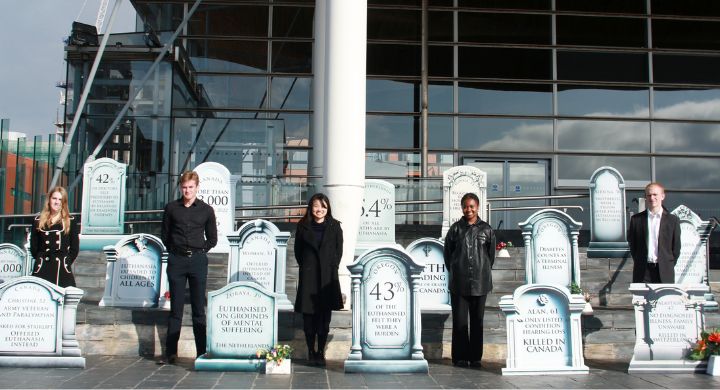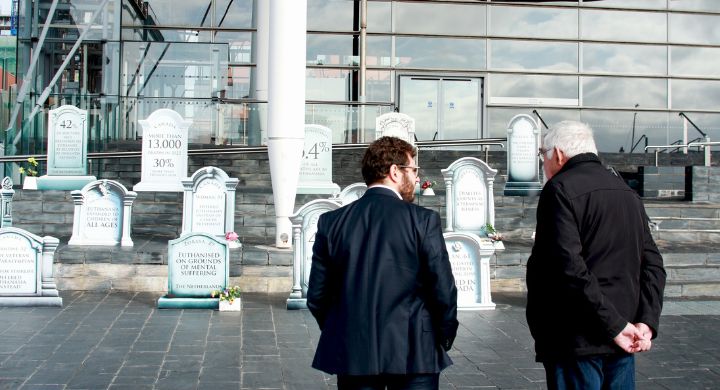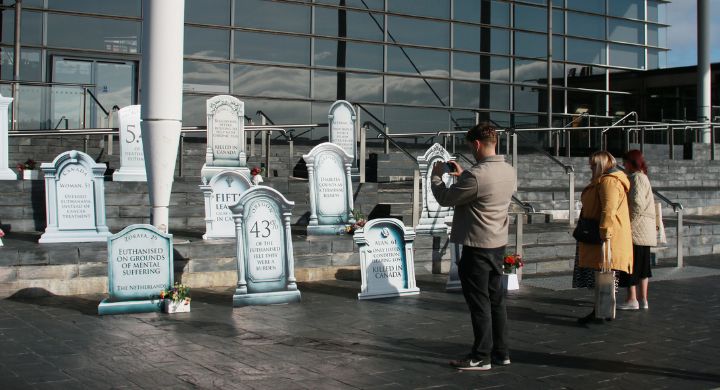Public Policy Researcher Carys Moseley reports on the Welsh Parliament’s debate on and subsequent vote against a pro-‘assisted dying’ motion
This past Wednesday 23rd of October, Members of the Welsh Parliament (Senedd) from all parties voted against a motion to support Kim Leadbeater’s Westminster bill for legalisation of assisted dying, as well as demanding expansion of the criteria, and calling for the Welsh Government to support the principle of ‘assisted dying’ and legalisation of the relevant policies. Whilst the vote itself is non-binding as Wales has no power to change the law, the debate and the vote are important as they send a warning message to the UK Labour government and Westminster MPs. Politicians focused heavily on the impacts on healthcare and palliative care, which are devolved to Wales. Their concerns are bound to echo again in Westminster in the coming weeks.
Motion was more extreme than Kim Leadbeater’s bill
Julie Morgan, the Labour MS for Cardiff North, tabled a motion which read as follows:
“To propose that the Senedd:
- Notes that responsibility for legislating to allow assisted dying is not devolved to Wales as it is currently a matter governed by criminal law.
- Notes that if assisted dying were to be legalised, and given its responsibility for health and social care, the Welsh Government would require an in-depth understanding of any proposals.
- Believes that adults of sound mind who are intolerably suffering from an incurable, physical condition and have a clear and settled wish to die should have the option of an assisted death, subject to robust safeguards.
- Notes that a recent inquiry by the Westminster Health and Social Care Committee found that the introduction of assisted dying has been linked with an improvement in palliative care in several jurisdictions.
- Notes that the Office of Health Economics found that even if they received the best possible palliative medicine, in England and Wales at least 5,000 per year would die without any effective pain relief in their final month.
- Notes that public attitudes towards assisted dying have changed, with up to 88% of the public favouring a change in the law.
- Notes that more than one suffering person a week from the UK now chooses to end their life at one of the Swiss end-of-life centres, yet many others who would choose the same cannot afford the high costs involved, often well over £10,000.
- Calls on the Welsh Government to:
a) support the principles of assisted dying; and
b) support Westminster parliament to introduce a compassionate assisted dying law in England and Wales.”
The demand that patients with ‘intolerable suffering’ should be allowed to access assisted suicide is much more subjective and therefore much wider than Kim Leadbeater’s bill, which would only allow terminally ill adults to be assisted to end their lives.

Humanists promoted the motion
Humanists UK and its Welsh chapter, Humanists Wales, supported the motion. Julie Morgan is one of their patrons, but unlike her colleague Mick Antoniw MS, she has not declared her link to Humanists UK as an interest on the Senedd Register of Interests. The Conservative MS James Evans, who was a speaker at this year’s Humanist conference in Cardiff, has also not declared this as an interest. He spoke in highly personal emotional terms in Wednesday’s debate, attempting to shame Christians for standing against assisted suicide.
Humanists organised a small rally in front of the Senedd, which involved a group of people, many of them quite young, chanting:
‘What do we want? Assisted dying. When do we want it? Now’.
This exactly echoes the pro-abortion chant often used by campaigners.
Mark Drakeford’s boast to Keir Starmer and the Humanists
Significantly, it appears that the Senedd was targeted by Humanists to promote the assisted suicide agenda across the UK. In a talk last June at the Humanist Convention in Cardiff, the outgoing First Minister of Wales, Mark Drakeford, said that he favoured legalising assisted suicide across the UK. He boasted to Keir Starmer that a vote in favour would easily pass in the Senedd. This is particularly obnoxious given that Drakeford was the Welsh Health and Social Care Minister before becoming First Minister.
Wednesday’s vote shows how wrong Mark Drakeford was. The fact that he gave the talk in the first place raises the question as to whether he is a member of Humanists UK. He has not declared any link on the Senedd form for private interests, or that of Welsh ministers.
First Minister Eluned Morgan and Health Secretary Jeremy Miles vote against motion
Mark Drakeford’s successor, Eluned Morgan, voted against the motion to legalise assisted suicide. Health Secretary for Wales, Jeremy Miles, was not set to debate, given his cabinet role. However, he did state that having reviewed the motion, he believed Kim Leadbeater’s bill would have a massive impact on the NHS in Wales. He did not seem to relish saying this.
It appears that the Welsh Government ministers have had a fright from the potential impact Kim Leadbeater’s bill could have on the NHS and social care. As Welsh Labour ministers, they are certainly not helped by the fact that Keir Starmer’s UK Labour government has recently cut the winter fuel allowance for pensioners and that much concern was also raised on Wednesday about the effect that the legalisation of assisted suicide would have on the most vulnerable and marginalised in society.
Cross-party concern about consequences of legalisation
You can read the entire transcript of the debate here.
Perhaps the most encouraging feature of the debate was the fact that members from every party in the chamber voted against the motion. Several Labour members voted against it, as did members of Plaid Cymru, a majority of the Conservatives, and the one Liberal Democrat. Three speeches stood out in particular.
Delyth Jewell from Plaid Cymru alarmed by the proposals in terms of their effect on social care, showing particular concern about disabled people and those marginalised in society. Her contention is that we look at this through the lens of those not necessarily surrounded by those they love – those marginalised in society. Regrettably, a supporter of assisted suicide sitting in the gallery above the chamber loudly whispered, ‘Shut up!’ whilst she was speaking.
Darren Millar from the Conservatives made it clear that his opposition to the motion was based on his Christian faith, stating that ‘all life is sacred’, that everybody is made in the image of God, and that ‘every single life has equal value and dignity, and is worth living’. He cited a warning by the Royal College of Psychiatrists that questioned whether psychological assessments for deeming people ‘of sound mind and settled will’ can truly act as a safeguard in the process of assisted suicide. He also cited evidence that palliative care has not improved as much in societies where assisted suicide has been legalised as in those where it remains illegal. This should put a stop to assisted suicide campaigners’ opportunistic claim to care about improving palliative care.
Mark Isherwood from the Conservatives reported on the serious concerns of groups such as Disability Wales and All Wales People First about the Westminster bill. Their concerns mean that no organisation for deaf and disabled people in the UK supports the bill.

Groundless and muddled thinking of proponents of legalisation
Watching the debate, it became clear that supporters of the motion pushed arguments that were either groundless or muddled.
Mick Antoniw, a professed Humanist, asserted that, “the role of Government is not to deny me that choice, but to set the legislative framework within which that choice can actually be exercised.”
He did not explain on what grounds people have a right to choose to commit suicide or ask for assistance to do so. Demanding that the government allow this – assisting suicide and therefore making doctors and healthcare workers accessories to murder – is the very opposite of what the Bible says government should be. In Romans 13 the Apostle Paul says that government should be ‘a terror to bad conduct’.
Several others of those who wanted to change the law nevertheless admitted to real fears about the dangers posed to vulnerable people. Adam Price (Plaid Cymru) confidently said this:
“If there is an argument at some future date, and there is a valid argument and a reasoned argument that we should amend the legislation, then we should consider that at that stage, but what we are talking about now is people who are in intolerable pain.”
There is no mention here of the fact that it would be too late to amend legislation after it was passed, as people would start to be candidates for assisted suicide soon after the law would be enacted.
What should we make of this dismissal of the slippery slope argument?
Humanists UK are building the slippery slope
The motion itself was part of the slippery slope deliberately constructed by Humanists UK, as its support for Julie Morgan’s motion showed it wants broader criteria for permitting assisted suicide than those found in Kim Leadbeater’s bill. The motion was so broad that it made Kim Leadbeater’s demands look more moderate and acceptable. This in itself functions as a campaign tactic favouring legalisation on grounds of terminal illness. Amendments to widen that law could be made at a later date.
This is not an accident. Back in July, Andrew Copson the CEO of Humanists UK welcomed Lord Falconer’s private member’s bill in the House of Lords, which would legalise assisted suicide for the terminally ill, with these words:
“Allowing people to choose the manner and moment of their own death should be seen as the hallmark of a compassionate society and recognised as a basic human right. As a first step towards a kinder, inclusive, and more dignified law on assisted dying, we welcome the introduction of this Bill and the opportunity it will create for parliamentarians to consider the overwhelming evidence favouring a change in the law. We pledge to work with Peers and MPs to make this Bill as compassionate as possible.” [Emphasis mine]
What will the next steps be after that first one? Humanists UK are building the slippery slope towards widening the criteria for euthanasia and assisted suicide.
Christian Concern display reveals consequence of slippery slope
Christian Concern took our tombstone display to Cardiff, displaying outside the Senedd the consequences of the slippery slope in different countries.
This featured in press coverage of the debate, and enabled passers-by at lunchtime to see what is really going on internationally. People raised all kinds of concerns with us. There are many undecided people out there who want all the facets of the debate to be aired.

Political parties split over the motion
The results of the vote on the motion were 26 against, 19 for, with the rest abstaining or not voting. Some did not vote because of absence, others because they had roles prohibiting a vote, e.g. the Llywydd (equivalent of the Speaker of the House of Commons).
Labour was very split, with eleven MSs voting against the motion, eleven for it, and the other seven abstaining or not voting.
Plaid Cymru was also very split, with four voting against, five for the motion, and three abstaining or not voting.
A majority of the Conservatives (ten) voted against the motion, with five abstaining or not voting, and one supporting it very vocally.
The one Liberal Democrat MS voted against the motion.
Warning to the UK Labour government
This vote was not the ringing endorsement for assisted suicide that Mark Drakeford told Keir Starmer would happen back in June. This in itself is a major setback for the pro-assisted-suicide campaign. The silence of supporters of assisted suicide is telling.
Labour Members of the Senedd in Wales do not sing from the same hymn-sheet on assisted suicide, so it stands to reason that Labour in Westminster will also be split. Jeremy Miles did not sound positive about the massive potential impact on the NHS in Wales. The Conservatives have in recent times pointed to the problems of the NHS in Wales as an example of where Labour is likely to go wrong in government.
Legalising assisted suicide could cause huge rifts within Labour, pitting Welsh Labour against Labour in Westminster on the very core matter of healthcare. It would be a very foolish and arrogant Labour government in London that would go ahead in such a situation.
Find out how you and your church can use your voice to speak against this dangerous bill.



